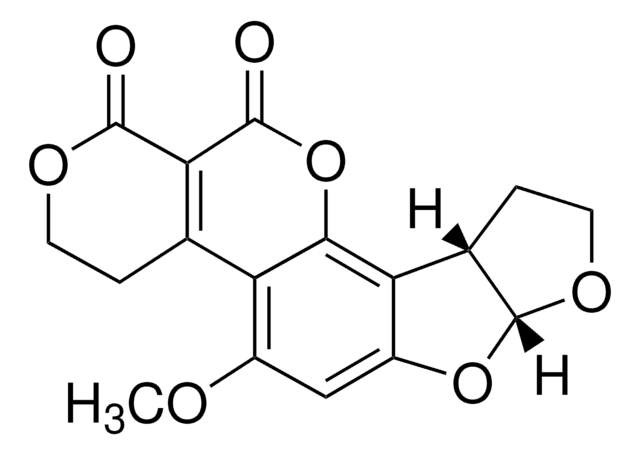Recommended Products
General description
Aflatoxins are hepatotoxic metabolites, which are produced by molds, such as Aspergillus flavus and Aspergillus parasiticus. They are naturally occurring poisonous carcinogens and the most widely known mycotoxins. They mainly contaminate fruits, vegetables and grains. Aflatoxins contaminate human food and animal feed. They are associated with liver cancer, immune system suppression, reduced growth rates, losses in feed efficiency and death. Aflatoxin B is more carcinogenic than Aflatoxin G.
Application
Aflatoxin B + G mixture has been used for the quantification of aflatoxin by high-performance thin-layer chromatography, using a charge-coupled device detector.
Reconstitution
Concentration: 5 μg aflatoxin B1, 1.5 μg aflatoxin B2, 5 μg aflatoxin G1, 1.5 μg aflatoxin G2 per mL after reconstitution to approx. 5 ml.
signalword
Danger
Hazard Classifications
Acute Tox. 1 Dermal - Acute Tox. 1 Oral - Acute Tox. 2 Inhalation - Carc. 1B - Muta. 1B - Repr. 2
Storage Class
6.1A - Combustible, acute toxic Cat. 1 and 2 / very toxic hazardous materials
wgk_germany
WGK 3
flash_point_f
Not applicable
flash_point_c
Not applicable
Certificates of Analysis (COA)
Search for Certificates of Analysis (COA) by entering the products Lot/Batch Number. Lot and Batch Numbers can be found on a product’s label following the words ‘Lot’ or ‘Batch’.
Already Own This Product?
Find documentation for the products that you have recently purchased in the Document Library.
Customers Also Viewed
Quantitative analysis of aflatoxins by high-performance thin-layer chromatography utilizing a scientifically operated charge-coupled device detector
Liang Y, et al.
Analytical Chemistry, 68(22), 3885-3891 (1996)
Toxigenic Aspergillus flavus and other fungi of public health concern in food and organic matter in southwest Nigeria
Fapohunda SO, et al.
Mycology, 3(3), 210-219 (2012)
Sittig's Handbook of Toxic and Hazardous Chemicals and Carcinogens, Volume 1, 210-219 (2008)
Review of past and present research on Aflatoxin in Uganda
Kaaya NA and Warren HL
African journal of food, agriculture, nutrition, and development, 5(1) (2005)
Production of aflatoxin on rice
Shotwell OL, et al.
Applied Microbiology, 14(3), 425-428 (1966)
Our team of scientists has experience in all areas of research including Life Science, Material Science, Chemical Synthesis, Chromatography, Analytical and many others.
Contact Technical Service








